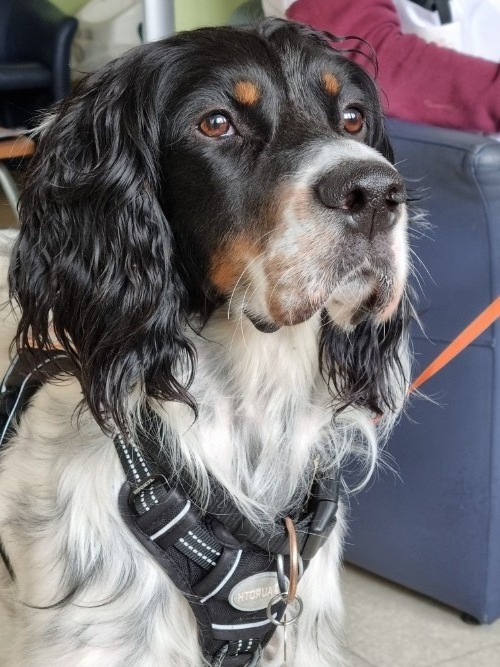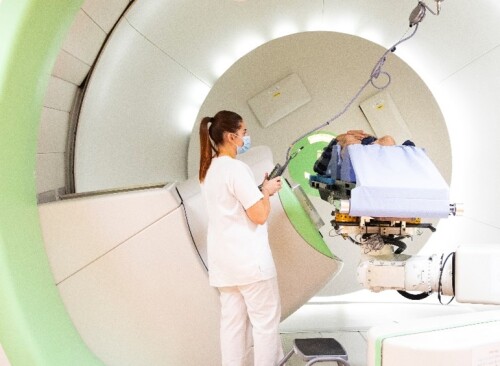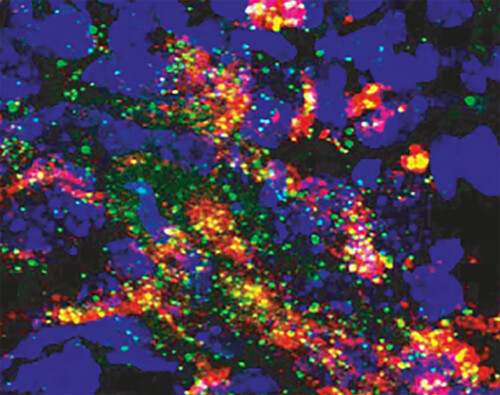Part of a health professional and patient well-being study, Snoopy’s job involves helping patients relax in waiting rooms and consultations (especially those who have trouble communicating) and spending time with patients in the lead-up to anxiety-inducing forms of treatment. Snoopy is currently learning a whole new skill-set, including lying down in front of patients and putting his paws on the bed. Having him in the break room will hopefully bring health professionals a breath of fresh air during their day, and lighten their emotional loads.
We’re confident that a therapy dog can bring so much to patients when they don’t want to talk, when they’re anxious, and especially for children and teens. For our healthcare teams, this is a wonderful way of lightening the load. We hope the findings to come out of this ground-breaking Institut Curie study will be positive and benefit patients and health professionals alike, paving the way for other bodies to move in this direction, notes Prof. Steven Le Gouill, Director of the Hospital Group.
A study designed to assess how Snoopy helps

Snoopy was adopted as part of a study on the benefits of emotional support dogs in hospitals, to be rolled out across three Institut Curie teams: the medical oncology day hospital, the support care team, and the medical oncology hospitalization team. It sets out to analyze well-being in the workplace as experienced
by the health professionals who have contact with the dog, and to assess how Snoopy impacts on patients’ and families’ communication, stress levels, and anxiety, as perceived by healthcare staff.
These experiments draw on scientific publications and reports on how therapy and emotional support dogs can deepen social ties and stimulate cognitive, emotional, social, sensory and psychomotor skills[1]. As well as being a comforting presence, having a therapy dog in the care unit can serve as a non-medicated approach to be used alongside traditional treatments.
It didn’t take long for Snoopy to adapt to his new environment, and he’s now something of a mascot among health professionals and patients. Having him around is intended to bring a lighter touch to the testing times and uncertainty that illness involves, and to help make waiting times more bearable (consultations, examinations, hospitalization). Reducing stress and anxiety is key and beneficial to caring for patients in hospital, explains Isabelle Fromantin, PhD, nurse and head of the Research and Wound Care Unit
|
Snoopy joins the Institut Curie team
Snoopy is a two-year-old English setter who was adopted from the SPA animal rescue center. He works with the Research and Wound Care Unit and is cared for by his handler, Marguerite Nicodème, an advanced practice nurse at Institut Curie, along with three specialists:
|
Putting animal welfare and sanitary guidelines at the forefront of the experiment
Snoopy’s care team oversees his welfare and health. For basic hygiene and safety purposes, Snoopy is never brought into treatment rooms, preparation rooms, and spaces used for patients with sepsis and aplasia.
[1] Bibliography references
> Jensen CL et al. The effects of facility dogs on burnout, job-related well-being, and mental health in pediatric hospital professionals. J Clin Nurs. 2021 May;30(9-10):1429- 1441
> Maurice C, Engels C, Canouï-Poitrine F, Lemogne C, Fromantin I, Poitrine E. Dog ownership and mental health among community-dwelling older adults: A systematic review. Int J Geriatr Psychiatry. 2022 Nov;37(11)
> Ginex P.et al. Animal-Facilitated Therapy Program: Outcomes from caring canines, a program for patients and staff on an in patient surgical oncology unit, CJON 2018, 22(2), 193-198
> Mueller et al. Human-animal interaction as a social determinant of health: descriptive findings from the health and retirement study. BMC Public Health (2018). doi:10.1186/s12889-018-5188-0




